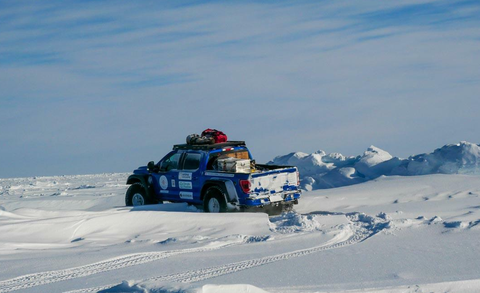
Transglobal Car Expedition
- The Transglobal Car Expedition is preparing for a massive round-the-world drive in 2024 and did some test drives of its heavily modified polar vehicles this spring.
- During that time, a modified Ford F-150 called the Arctic Trucks AT44 fell through the ice in far northern Canada. No one was hurt and the expedition ended up completing the crossing.
- The group has a “leave no trace” mentality, so they have spent the intervening time figuring out how best to return the AT44 to the surface. The efforts started for real this past week, and they involve divers, giant flotation devices, and a heavy-duty helicopter. We’ll update this story when they get the truck free.
The Transglobal Car Expedition is a great idea that has seen some early success despite a rough start that included the loss of one adventure-modified Ford pickup. The international group of adventure drivers is in the early stages of an 18-month pole-to-pole, vertical circumnavigation drive using floating and amphibious vehicles.
In March, as the group was driving on the ice near the Tasmania Islands in the Nunavut territory in far northern Canada, a heavily modified Ford F-150 with 44-inch flotation tires sank into the depths “in an area of rapidly shifting ice on a heavy current,” the group would later say. No one was hurt, and the group continued north.
In the end, the group managed to complete what it’s calling the world’s first overland wheeled crossing from the continental shelf of Canada to the high Arctic, just one vehicle short of a full pack.
The 16-member Transglobal Car Expedition is made up of Americans, Canadians, Ukrainians, Russians, and Icelanders. The expedition is being organized by the Swiss nonprofit group GoodGear, which has a mission to “bring innovative technologies to locations around the world for the betterment of local communities and the advancement of scientific research.” That does not mean leaving a truck at the bottom of the cold ocean, though. Andrew Comrie-Picard, a Canadian member of the group, told the CBC in March that the group’s mentality is to leave things the way they were before a fleet of heavily modified trucks passes through.
This content is imported from Facebook. You may be able to find the same content in another format, or you may be able to find more information, at their web site.
“That’s one of the things we want to make sure of, and make sure that our tracks basically get blown away in the wind,” Comrie-Picard said in March.
Which is why the group returned to the Tasmania Islands last week, to start recovery efforts for the truck. The plan is to use a team of “highly experienced Arctic divers” who will attach inflatable bags to the truck to float it to the surface. Once back on land, the truck will be inspected and then airlifted with a Coldstream Helicopters’ heavy lift helicopter to Gjoa Haven, some 186 miles away. Gjoa Haven is where the team has set up its command center for this operation and where the car will be put on a sealift vessel to be sent to Montreal.
The truck’s modifications were done by Arctic Trucks, which charges $75,000 (and a donor truck) for its standard work that makes the truck more capable of driving over ice and snow.
The Transglobal Car Expedition said it worked with local communities and regional and federal authorities to find safe and effective ways to recover the truck.
“This incident has improved our understanding of the safety measures needed for the planned full circumnavigation of the globe in 2024,” the group said in a statement. “It has also provided important data on the viability of travel on the ice in the context of global warming, which is making traveling over the ice more dangerous for Indigenous communities and other ice travelers.”
This content is imported from {embed-name}. You may be able to find the same content in another format, or you may be able to find more information, at their web site.
#Divers #Prepare #Pull #Chilly #Ford #F150 #Canadian #Waters
Source link






